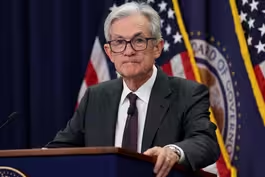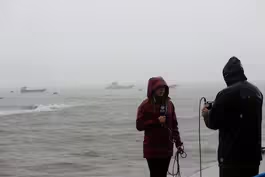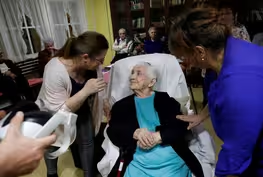
Colorado AG on why the state is suing a deputy who aided ICE
Clip: 7/30/2025 | 8m 26sVideo has Closed Captions
Colorado AG explains why the state is suing a deputy who aided ICE
The state of Colorado is suing a local sheriff’s deputy, accusing him of aiding federal immigration agents with the arrest of a college student with an expired visa. Attorney General Phil Weiser says the deputy violated state laws that ban state and local government employees from cooperating with federal officials on immigration enforcement. Weiser joined Geoff Bennett to discuss the case.
Problems playing video? | Closed Captioning Feedback
Problems playing video? | Closed Captioning Feedback
Major corporate funding for the PBS News Hour is provided by BDO, BNSF, Consumer Cellular, American Cruise Lines, and Raymond James. Funding for the PBS NewsHour Weekend is provided by...

Colorado AG on why the state is suing a deputy who aided ICE
Clip: 7/30/2025 | 8m 26sVideo has Closed Captions
The state of Colorado is suing a local sheriff’s deputy, accusing him of aiding federal immigration agents with the arrest of a college student with an expired visa. Attorney General Phil Weiser says the deputy violated state laws that ban state and local government employees from cooperating with federal officials on immigration enforcement. Weiser joined Geoff Bennett to discuss the case.
Problems playing video? | Closed Captioning Feedback
How to Watch PBS News Hour
PBS News Hour is available to stream on pbs.org and the free PBS App, available on iPhone, Apple TV, Android TV, Android smartphones, Amazon Fire TV, Amazon Fire Tablet, Roku, Samsung Smart TV, and Vizio.
Providing Support for PBS.org
Learn Moreabout PBS online sponsorshipGEOFF BENNETT: The state of Colorado is suing a local sheriff's deputy, accusing him of aiding federal immigration agents with the arrest of a college student with an expired visa.
Last month, Mesa County Deputy Alexander Zwinck pulled over 19-year-old nursing student Caroline Dias Goncalves during a traffic stop.
The Colorado attorney general's office alleges the deputy then shared Dias Goncalves' location and a description of her vehicle in a group chat that included ICE agents and bodycam footage of the arrest.
The deputy also asks her where she was born.
ALEXANDER ZWINCK, Mesa County, Arizona, Sheriff's Office: Where are you from?
You got a little bit of an accent.
CAROLINE DIAS GONCALVES, Nursing Student: I'm from Utah.
ALEXANDER ZWINCK: You're from Utah?
OK. How long have you lived in Utah for?
CAROLINE DIAS GONCALVES: About 12 years.
ALEXANDER ZWINCK: Born and raised or no?
CAROLINE DIAS GONCALVES: No, I was born in -- oh, my gosh.
I always forget -- down -- I was born in Brazil.
GEOFF BENNETT: After letting her go, the student was arrested by federal immigration authorities and spent more than two weeks in an ICE detention center.
In a statement, she said: "The past 15 days have been the hardest of my life.
I was scared and felt alone.
I was placed in a system that treated me like I didn't matter."
Colorado Attorney General Phil Weiser says the arrest violated state laws that ban state and local government employees from cooperating with federal officials on immigration enforcement.
His office is also investigating a handful of local law enforcement agencies accused of participating in that group chat.
And the Colorado attorney general joins us now.
Thanks for being with us.
PHIL WEISER (D), Colorado Attorney General: Happy to join you.
GEOFF BENNETT: So we just unpacked a lot of information about this case there.
Why did you decide to bring this lawsuit?
What made the sheriff's deputy's conduct, in your view, cross a legal line?
PHIL WEISER: Colorado's law is very clear.
Law enforcement does law enforcement.
In Colorado, law enforcement doesn't do federal immigration enforcement.
The line is when a sheriff's deputy, in this case, actually detain somebody in a vehicle for the purpose of enabling federal immigration enforcement to detain that person.
At that point, you're not operating as a Colorado law enforcement anymore, because there was no Colorado law that was determined to be violated.
There was a warning given, but there was no criminal action.
She hadn't committed any crimes.
All she was being held for were immigration related matters, which means a law enforcement officer is using his time to do work that Colorado law says you can't do.
Another point, of course, is he spends a fair bit of time actually asking her about her immigration status, looking to enforce immigration law.
That's not his job.
He violated Colorado law.
That's why we brought the case.
GEOFF BENNETT: The Department of Justice, as you well know, has filed a federal lawsuit against Colorado's sanctuary policies, alleging they obstruct immigration enforcement.
In the most recent complaint from the DOJ, they directly address your lawsuit.
And the DOJ attorney says this: "When officers choose to cooperate with federal immigration enforcement agents to keep their communities safe and enforce federal law, the state of Colorado hauls them into court as punishment for doing their jobs."
What's your response to that criticism?
PHIL WEISER: It's very important to note here, this wasn't about community safety.
There was no basis for concern that she had committed any crime, posed any threat to public safety.
When there are people who commit violent crimes, crimes that warrant being deported, Colorado law enforcement routinely will share information, as provided under Colorado law, so that ICE can do their job and deport people who are dangerous.
But this was a case of someone who hadn't done anything wrong, didn't pose any threat to public safety.
In that case, Colorado law enforcement shouldn't take it upon an individual to go ahead and start acting as if you're doing federal immigration enforcement solely for purposes of enforcing immigration law, which is totally federal, not for purposes of keeping communities safe.
That's what a state's job is.
GEOFF BENNETT: Well, I was going to ask you about that.
You almost answered my next question about the broad prohibitions on data sharing and restricting local cooperation with the federal government on immigration.
How does that not undermine public safety or a federal investigation into crime or fraud?
PHIL WEISER: Well, if there's an actual criminal investigation that's happening, in that place, there is actual cooperation around a crime.
That's a very different situation.
We in Colorado cooperate all the time with federal law enforcement partners.
And if someone is here without authorization and they have done harmful, dangerous actions, they should be held to account.
But what Colorado law says is, we need our law enforcement focused on law enforcement.
We don't have enough law enforcement officers in Colorado.
That's a public policy decision that we're making not to do the federal government's work.
It's their job to do that work.
And the problem with this lawsuit you mentioned is, they're trying to coerce us in Colorado to do their jobs.
They're threatening us, saying, we're going to hold you in some sort of negative way.
And we have had funds threatened before.
We have got cases involving emergency management funds, transportation funds where the federal government is saying, if we don't do their work for them, they're going to withhold money from us.
That's a blatant violation of the Constitution.
We're a sovereign state.
We get to make decisions about how our law enforcement do their work.
GEOFF BENNETT: On another matter, as I understand it, you have raised concerns about immigration agents, ICE agents operating in Colorado while wearing face masks that obscure their identities.
Tell us more about that and whether Colorado can do anything, has the authority to mandate that they remove their face masks.
PHIL WEISER: It's up to the federal government to make sure that federal law enforcement operate in a transparent and trustworthy manner.
In Colorado, I oversee law enforcement in a manner that seeks to build trust through transparency.
That means Colorado law enforcement officers have bodycams on them.
They're identifiable and they're in recognized clothing, unless in exceptional situations where it is warranted to be in plainclothes.
But ICE, as you note, they're operating in plainclothes with masks.
They can't be identified as ICE agents.
That's a threat to public safety.
Others can mimic being an ICE agent, engage in kidnapping pretending to be an ICE agent.
That's a threat to public safety, which is -- myself and a large number of my colleagues from the attorney general world, we have called on Congress to do something about this.
This is not sound law enforcement.
This is a threat to public safety.
GEOFF BENNETT: And, of course, they maintain that they obscure their identities because they're concerned about their own safety, to which you would say what?
PHIL WEISER: There are many cases that I can't see any plausible basis for an ICE agent to be worried about safety, when you're taking any number of deportation actions for people who didn't get whatever justification they were seeking to stay, there's no basis for concern.
And law enforcement takes on all sorts of situations where you're investigating crimes where you're not worried about a life-and-death situation.
There are some, and we recognize, maybe a cartel, maybe other dangerous, violent gangs where you would want to essentially be hidden.
But those are the exceptions.
What ICE is doing here is, they're acting as if they can't ever operate in plain sight, in transparency, and that's a way to undermine trust, gives rise to this concern I mentioned about copycat or mimicking of ICE.
It's not sound law enforcement.
We're calling on Congress to change it.
GEOFF BENNETT: Democratic leaders like yourself have taken a stand against what many Democrats see as the Trump administration's overreach on immigration enforcement.
Do you see your approach as part of a broader Democratic effort to push back?
And might this potentially serve as a model for other states?
PHIL WEISER: I see my job as enforcing Colorado law.
Whether or not people agree with the law or not, it is the law.
It's important that the law be respected,.
As someone who's elected by the people of Colorado to make sure that our laws are followed, that's how I want to do my work.
Whether or not other states follow our leader or not, that's up to them.
I'm here in Colorado serving our communities.
Part of that is building trust in law enforcement, knowing that our law enforcement does law enforcement, doesn't do immigration enforcement.
Whether other states follow that lead, that's up to them.
GEOFF BENNETT: Phil Weiser, the attorney general for Colorado, thanks again for being with us.
We appreciate it.
PHIL WEISER: Thank you.
Dog Lady's Brief But Spectacular take on rethinking rescue
Video has Closed Captions
Clip: 7/30/2025 | 3m 29s | The Dog Lady's Brief But Spectacular take on Rethinking Rescue (3m 29s)
Economy grows more than expected despite trade war concerns
Video has Closed Captions
Clip: 7/30/2025 | 7m 32s | Economy grows more than expected despite trade war concerns (7m 32s)
Hawaii avoids major damage after quake triggers tsunami
Video has Closed Captions
Clip: 7/30/2025 | 4m 14s | Hawaii avoids major damage after massive earthquake triggers tsunami (4m 14s)
Louisiana braces for impact of Medicaid cuts
Video has Closed Captions
Clip: 7/30/2025 | 4m 7s | Medicaid recipients in Louisiana brace for impact of work requirements and cuts (4m 7s)
News Wrap: Israeli strikes, gunfire kill at least 46 in Gaza
Video has Closed Captions
Clip: 7/30/2025 | 9m 5s | News Wrap: Israeli strikes and gunfire kill at least 46 in Gaza (9m 5s)
Pronatalism movement encourages people to have more babies
Video has Closed Captions
Clip: 7/30/2025 | 9m 37s | A look inside the pronatalism movement encouraging Americans to have more children (9m 37s)
Simple lifestyle changes that could help prevent dementia
Video has Closed Captions
Clip: 7/30/2025 | 6m 34s | Study reveals simple lifestyle changes could help prevent dementia (6m 34s)
Providing Support for PBS.org
Learn Moreabout PBS online sponsorshipSupport for PBS provided by:
Major corporate funding for the PBS News Hour is provided by BDO, BNSF, Consumer Cellular, American Cruise Lines, and Raymond James. Funding for the PBS NewsHour Weekend is provided by...


















